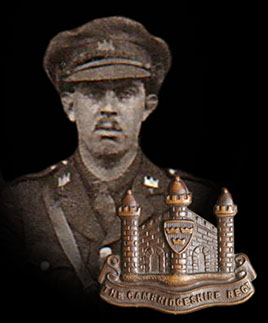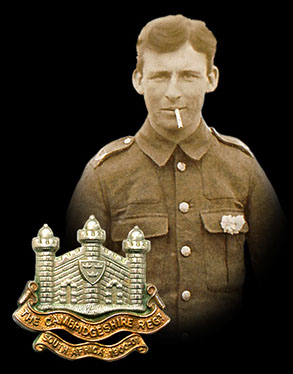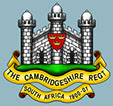
Who Were
The Cambs
The Cambs
at War
1/1st Btn 1914-1919
1914 - 1/1st Overview
1915 - 1/1st Overview
1915 - St Eloi
1915 - Fosse Wood
1916 - 1/1st Overview
1916 - The Schwaben
1916 - St Pierre Divion
1917 - 1/1st Overview
1917 - St Julien
Insignia, Medals & Books
Remembering The Cambs
Biographies
About Us &
This Site
Raiders on the Somme
After the exploits of early September to the north of the Ancre valley, the Cambridgeshires moved on September 12 into the sector around the tiny village of Hamel overlooking the River Ancre.
They would remain until October 3, prompting commanding officer, Lt-Col Ted Riddell, to state in the battalion history:
I doubt if any other battalion held a sector of the front for so long a period during the battle of the Somme. An average of 74 shells a day fell in our battalion lines during that time, and no day passed without some human casualties or destruction of material.
Battalion HQ was in dugouts on the hillside at Hamel and 300 yards ahead were the remains of Hamel Mill, which the Cambridgeshires occupied as a detached post. A mile to the north-east was St Pierre Divion, with Beaucourt, Grandcourt and Miraumont beyond.
High command wanted information about German dispositions in the area so battalions were called upon to make thorough observations and regular patrols and even raids across No Man’s Land. The Cambridgeshires were called upon to make two raids on the evening of September 16. This article coves the raid on the north of the Ancre Valley.
This effort, to raid north-east of Gordon Trench, would be made by members of C Company under Capt Alleyne Marr, the son of a Cambridge University professor of geology. Marr attended Oundle School, where he served in its Officer Training Corps, before going up to St John’s College, Cambridge, in 1913 where he also joined the University OTC and was commissioned into the Cambridgeshire Regiment in October 1914.
The raiders assembled behind a bank in the rear of Roberts Trench (located in the fields close to what is now the site of Ancre British Cemetery alongside the D50 road). Two platoons of D Coy would be in support at Hamel.
Lt-Col Riddell, observing from 100 yards behind the British front line, was unhappy with this enterprise:
The raid began. At one moment all was quiet. The next, trench mortars fired and shells from our artillery swished over our heads to the German wire and trenches, while machine guns rattled,” he wrote. “As I expected the enemy was prepared. His shells crashed into the ground about us and tore up our communication trenches in his first fear of an attack in force.
Riddell described it as an heroic affair, as indeed all raids were; but it failed. The raiders had found the German wire had not been cut, making it impassable, so they had to retreat to Roberts Trench.
Riddell wrote:
Young Allpass forced his way into the German wire with unrivalled bravery, only to be killed. The splendid efforts of his men to recover his body being of no avail, the company returned to our lines with eight of their number wounded.
One of the raiders was L/Cpl Fred Lanham, from Cambridge, who was wounded when he gashed his arms and legs retreating through the German wire, he wrote an interesting account of the episode.
We started the raid about midnight, and crawled on our hands and knees towards Fritz’s trenches until we got to his wire, which we were told had been cut by our own artillery so that we could get straight to his trenches, but to our disappointment we found his wire was about 40 to 50 yards deep.
In his account, slightly different to Riddell’s, he revealed that Lt ‘Rex’ Allpass, Sgt Death, Harry Cowling and himself managed to get within 10 yards of 'Fritz’s' trench, but the remainder of the party had, no doubt due to the thickness of the wire, been ordered to retire.
He continued:
We had lost connection so there we laid. A German sentry spotted us, and I quite distinctly heard him mumble something with the result that they opened rapid fire on us. Lt Allpass went on about five yards further, but one of the Fritzes spotted him and threw a bomb at him. It missed him, but when it burst it flew in all directions. Quite a number of pieces hit Mr Allpass wounding him in several places. He managed to crawl to a shell hole, where we bandaged him up. We tried to get him away, but it was of no avail.
Soon the Germans decided to investigate what was going on in front of their wire and sent up a flare to illuminate the area.
Lanham continued:
We laid as quiet as mice until a light went up, then we were able to see what it was. About 30 Germans were coming slowly towards us as near as I can say about 40-yards away. Our number then was only five. We took to our heels and got back as best we could. It was getting back when I scratched myself all over. Harry Cowling was taken prisoner and so was Mr Allpass.
Lanham’s wound turned septic and he was sent back to the UK and into hospital in Cardiff. He would return to the Western Front a few months later, being wounded twice more in 1918 and being awarded the Military Medal during the Advance to Victory.
The captured wounded officer, Lt Allpass, who was a war poet, was a clergyman’s son and had been schooled at Chigwell in Essex and Exeter College, Oxford, where he studied Modern Languages and was a friend of J R Tolkien, became a Fabian and a comic writer for The Westminster Review and Isis. Allpass became a teacher at St Bees School, Cumbria and where he commanded the school’s Officer Training Corps. In 1915 he transferred to the Essex Regiment and was soon attached to 3/1st Btn Cambs Regt, being sent to the 1/1st Battalion in July 1916. He has no known grave and is listed on the Thiepval Memorial to the Missing.
Cowling, from Cambridge, was only the second man in the battalion to be taken prisoner (the first being Sgt Walter French during St Eloi mine explosion in March 1915). He was repatriated in December 1918.
Other men known to have been wounded on the raid were Privates Charles Gibson, William Howlett, Henry Whitmore, and David Creek.
In conjunction with this raid on the north of the Ancre valley, the Cambridgeshires sent a small patrol to investigate a German strong point called the Summer House. It would turn into a disaster, but that’s another story…
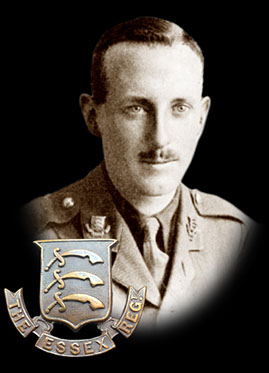
Lt Rex Allpass, killed during the raid.
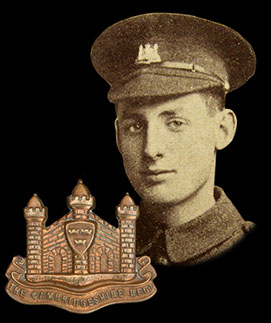
Fred Lanham from Cambridge.

This site went live on the 14th February 2015 to mark 100 years since the 1/1st Cambs went off to war.
WE WILL REMEMBER THEM
Email us: cambsregt@gmail.com
Copyright 2015, 2016, 2017, 2018, 2019 by Felix Jackson. The information and images on this site should not be reproduced without prior permission.
